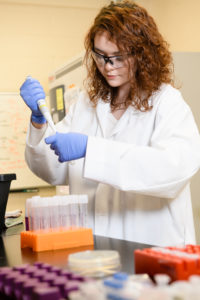 Yomaira Pagán-Torres is an Associate Professor in the Department of Chemical Engineering at the University of Puerto Rico at Mayaguez. Dr. Pagán-Torres received her PhD degree in Chemical Engineering from the University of Wisconsin-Madison in 2011, under the supervision of Prof. James A. Dumesic. During her PhD studies, Dr. Pagán-Torres conducted a research internship with Dr. Esben Taarning at Haldor Topsøe in Denmark. Before her academic position at UPR, she worked for The Dow Chemical Company as Senior Engineer in the Feedstocks, Olefins, Chemicals & Alternative Technologies Research & Development group in Freeport, Texas. Her research focuses on the design and synthesis of novel heterogeneous catalytic materials with tailored active sites for the transformation of carbon resources, such as biomass, carbon dioxide, and methane to chemicals and fuels.
Yomaira Pagán-Torres is an Associate Professor in the Department of Chemical Engineering at the University of Puerto Rico at Mayaguez. Dr. Pagán-Torres received her PhD degree in Chemical Engineering from the University of Wisconsin-Madison in 2011, under the supervision of Prof. James A. Dumesic. During her PhD studies, Dr. Pagán-Torres conducted a research internship with Dr. Esben Taarning at Haldor Topsøe in Denmark. Before her academic position at UPR, she worked for The Dow Chemical Company as Senior Engineer in the Feedstocks, Olefins, Chemicals & Alternative Technologies Research & Development group in Freeport, Texas. Her research focuses on the design and synthesis of novel heterogeneous catalytic materials with tailored active sites for the transformation of carbon resources, such as biomass, carbon dioxide, and methane to chemicals and fuels.
She will be presenting “Hydrodeoxygenation of Biomass-Derived Alcohols and Acids over Supported Metal-Metal Oxide Catalysts.” The abstract is as follows:
Lignocellulosic biomass, as an abundant source of renewable carbon, is a promising feedstock for the production of biobased chemicals. However, the highly complex structure and high oxygen content of biomass-derived molecules require the development of active, stable, and selective catalysts to promote selective C-O, C-H, and C-C bond cleavage. In this talk, we present catalytic strategies for deoxydehydration (DODH) and hydrodeoxygenation (HDO) of carbohydrate-derived alcohols and acids to platform chemicals. In an example, we demonstrate the selective conversion of tartaric acid to succinic acid in >96% yield over heterogeneous catalyst comprised of a noble metal and an oxophilic metal. Our results suggest that the HDO of tartaric acid proceeds through two reaction pathways. One reaction pathway involves the DODH of tartaric acid to fumaric acid, followed by the hydrogenation of the C=C bond to succinic acid. Whereas, the other reaction pathway proceeds through the HDO of internal –OH groups to produce malic acid as a reaction intermediate. We also discuss the role of the noble metal, metal oxide species, and the catalyst support in the selective C-O bond cleavage of tartaric acid to succinic acid.


